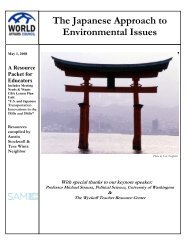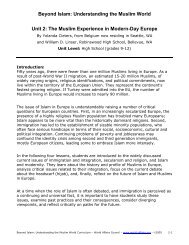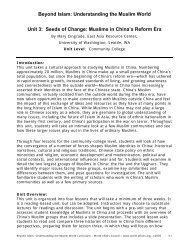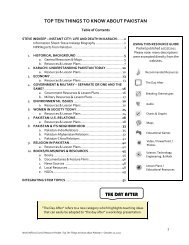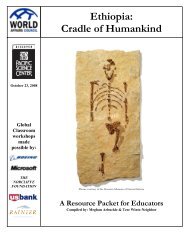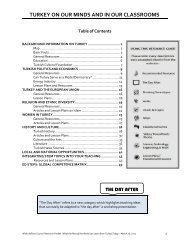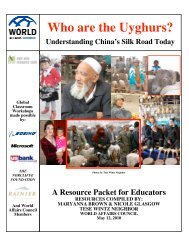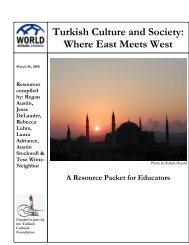The Question(s) of Tibet - World Affairs Council
The Question(s) of Tibet - World Affairs Council
The Question(s) of Tibet - World Affairs Council
Create successful ePaper yourself
Turn your PDF publications into a flip-book with our unique Google optimized e-Paper software.
ENVIRONMENTAL ISSUES<br />
TIBET ENVIRONMENTAL WATCH<br />
http://www.tew.org/index.html<br />
<strong>The</strong> site features regularly updated information on environmental problems in <strong>Tibet</strong>.<br />
Information includes wildlife, geography, development, etc.<br />
WORLD WATCH INSTITUTE<br />
http://www.worldwatch.org/About<br />
<strong>The</strong> <strong>World</strong>watch Institute is an independent research organization recognized by opinion<br />
leaders around the world for its accessible, fact‐based analysis <strong>of</strong> critical global issues. <strong>The</strong><br />
Institute's three main program areas include Climate & Energy, Food & Agriculture, and the<br />
Green Economy. Great searchable information about <strong>Tibet</strong> included on the website.<br />
TIBET’S ENVIRONMENTAL ISSUES RAISED ON SIDELINES OF UN SESSION IN GENEVA<br />
(10/3/10)<br />
http://www.tibetcustom.com/article.php/20101003083154526<br />
"<strong>The</strong> <strong>Tibet</strong>an Plateau is one <strong>of</strong> the earth’s most sensitive environments and a unique biogeographical<br />
zone", said Mr. Tenzin Norbu, a <strong>Tibet</strong>an environmental expert during a<br />
presentation on the sideline <strong>of</strong> the 15th session <strong>of</strong> UN Human Rights <strong>Council</strong> in Geneva on 27<br />
September. "It’s warming about three times the global average. Twenty percent <strong>of</strong> <strong>Tibet</strong>an<br />
glaciers have retreated in the past 40 years." Mr. Norbu made the above remarks during the<br />
15th session <strong>of</strong> Human Rights <strong>Council</strong> held here at Geneva. He is the head <strong>of</strong> the Environment<br />
and Development Desk <strong>of</strong> the Central <strong>Tibet</strong>an Administration in Dharamsala, India. He gave a<br />
detailed account <strong>of</strong> the environmental concerns on the <strong>Tibet</strong>an Plateau. He said these impacts<br />
are creating problems not only to the six million <strong>Tibet</strong>ans living on the <strong>Tibet</strong>an Plateau but also<br />
to the billions <strong>of</strong> people especially in India, China and the neighbouring countries. He also said<br />
that the secret constructions <strong>of</strong> dams on <strong>Tibet</strong>an plateau by the Chinese government on the<br />
Yarlung Tsangpo (Brahmaputra), Dri Chu (Yangtze River) and Salween will have serious impacts<br />
on livelihood <strong>of</strong> downstream inhabitants <strong>of</strong> Vietnam, Laos, Cambodia, Pakistan, Burma and<br />
India and the bio‐diversity.<br />
THE LEGAL STATUS OF TIBET AND CHINA'S INTERNATIONAL RESPONSIBILITIES IN<br />
MANAGING TIBET'S ENVIRONMENT: USING LAW AND POLITICS TO PROTECT TIBET'S<br />
ENVIRONMENT<br />
http://www.tibetjustice.org/reports/enviro/enviro.html<br />
I will summarize the current international legal framework as it affects <strong>Tibet</strong>'s prospects for<br />
change and propose avenues <strong>of</strong> action for the international community. My focus is on two<br />
goals: first, to speed the day when <strong>Tibet</strong>ans can freely exercise their right <strong>of</strong> self‐determination<br />
in government and in resource management; and second, to reduce the environmental harm<br />
that will occur in the meantime.<br />
THE RELATIONSHIP BETWEEN ENVIRONMENTAL MANAGEMENT AND HUMAN RIGHTS<br />
IN TIBET (1992)<br />
http://www.tibetjustice.org/reports/enviro/env_human_rights.html<br />
<strong>The</strong> United Nations Sub‐Commission on Prevention <strong>of</strong> Discrimination and Protection <strong>of</strong><br />
Minorities <strong>of</strong> the Commission on Human Rights ["the Sub‐Commission"] is currently studying<br />
the nature <strong>of</strong> the interrelationship between human rights and environmental degradation, to<br />
<strong>World</strong> <strong>Affairs</strong> <strong>Council</strong> Teacher Resource Packet – <strong>The</strong> <strong>Question</strong>(s) <strong>of</strong> <strong>Tibet</strong> February 28, 2011<br />
14



